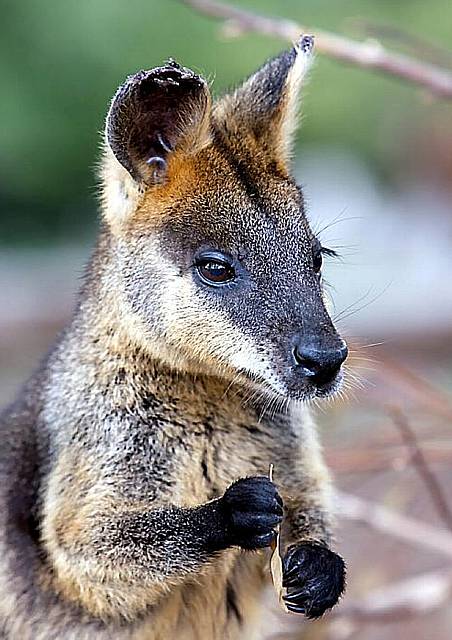Wallabies that wannabe in Saddleworth!
Reporter: Ken Bennett
Date published: 11 August 2009

Wallabies that wannabe in Saddleworth!
Saddleworth may have become home to an elusive, new visitor . . .wallabies.
Two of the creatures were sighted in a field near to Dobcross village and animal-lovers are welcoming their arrival.
Michael Powis, who runs the Dobcross Diary, said: “Two highly respected women in the community saw a pair of wallabies when they were out walking. I have no reason to doubt the sighting.”
And Helen Taylor, who runs the Saddleworth Llama trekking centre at Denshaw, said enthusiastically: “We would love to have some wallabies at our animal farm if the opportunity ever arises. But we would have to erect six-foot high fences — because they can jump really high!”
She said there was a population of wallabies in the Peak District near Buxton from the 1930s to early this century.
“I think they could live in Saddleworth as they love open countryside and heather land and would eat the grasses and any low growing vegetation.
“They cannot tolerate extreme cold, but our climate is getting milder and, given the right conditions, they could thrive again if they managed to pair up.
“This could start a breeding programme in the autumn with a joey being born 30 days later and then carried in the pouch for a further 39 weeks.
“Wallabies are very shy and avoid any sort of human contact wherever they can,” she added.
And she said the wallabies could have escaped from a private collection and joined other wild animals that have escaped and roam the moors.
The London-based People’s Trust for Endangered Species is a charity with special focus on native mammals.
Their chief executive, Jill Nelson, said: “I think it is possible for wallabies to be seen as far north as Saddleworth.
“I know of one that escaped from Whipsnade Zoo some years ago. They are survivors and although they are shy they can be friendly.”
FACTFILE
Wallabies are generally secretive animals, lead quiet lives and are sensitive to intrusion
If they sense danger, they slap their feet on the ground to warn others near-by.
They have no natural predators in the UK, but the young are sometimes killed by dogs or foxes. Like many other mammals, they are sometimes the victims of road accidents.
Most Viewed News Stories
- 1You can score free tickets to a Latics game while supporting Dr Kershaw’s Hospice
- 2Primary school in Uppermill considers introducing new ‘faith-based’ entry criteria to tackle...
- 3Public inquiry announced into rail upgrade that could leave villages ‘cut off’ for months
- 4Tributes paid following death of hugely respected Oldham community figure Dale Harris
- 5Trio arrested, drugs and weapons seized following Chadderton raid




